The Xeon Entry Quad-Core CPU Review: Xeon E-2174G, E-2134, and E-2104G Tested
by Ian Cutress on March 11, 2019 10:30 AM EST- Posted in
- CPUs
- Xeon
- Enterprise CPUs
- Coffee Lake
- Xeon E
- C246
CPU Performance: Encoding Tests
With the rise of streaming, vlogs, and video content as a whole, encoding and transcoding tests are becoming ever more important. Not only are more home users and gamers needing to convert video files into something more manageable, for streaming or archival purposes, but the servers that manage the output also manage around data and log files with compression and decompression. Our encoding tasks are focused around these important scenarios, with input from the community for the best implementation of real-world testing.
All of our benchmark results can also be found in our benchmark engine, Bench.
Handbrake 1.1.0: Streaming and Archival Video Transcoding
A popular open source tool, Handbrake is the anything-to-anything video conversion software that a number of people use as a reference point. The danger is always on version numbers and optimization, for example the latest versions of the software can take advantage of AVX-512 and OpenCL to accelerate certain types of transcoding and algorithms. The version we use here is a pure CPU play, with common transcoding variations.
We have split Handbrake up into several tests, using a Logitech C920 1080p60 native webcam recording (essentially a streamer recording), and convert them into two types of streaming formats and one for archival. The output settings used are:
- 720p60 at 6000 kbps constant bit rate, fast setting, high profile
- 1080p60 at 3500 kbps constant bit rate, faster setting, main profile
- 1080p60 HEVC at 3500 kbps variable bit rate, fast setting, main profile
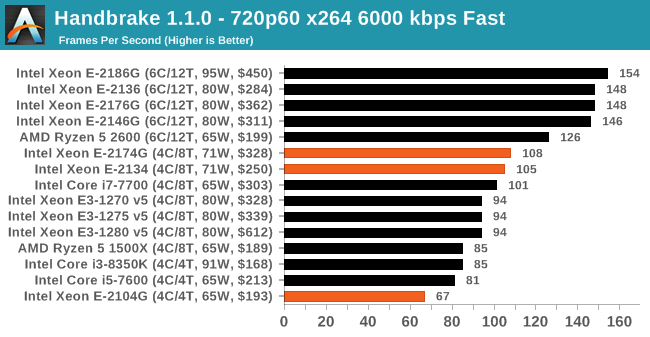
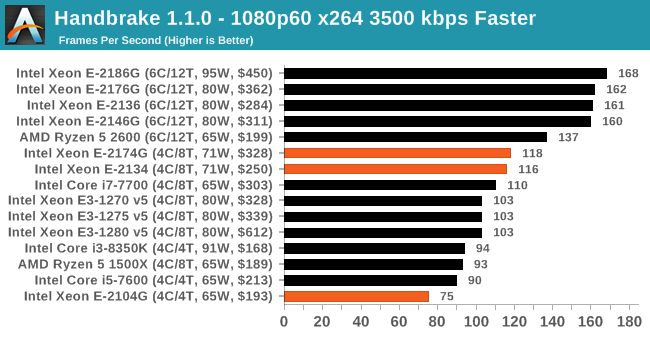
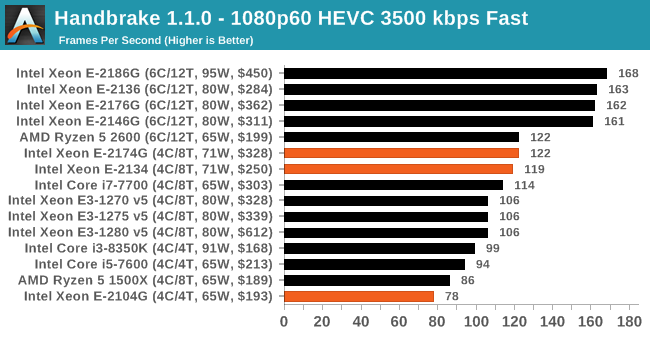
7-zip v1805: Popular Open-Source Encoding Engine
Out of our compression/decompression tool tests, 7-zip is the most requested and comes with a built-in benchmark. For our test suite, we’ve pulled the latest version of the software and we run the benchmark from the command line, reporting the compression, decompression, and a combined score.
It is noted in this benchmark that the latest multi-die processors have very bi-modal performance between compression and decompression, performing well in one and badly in the other. There are also discussions around how the Windows Scheduler is implementing every thread. As we get more results, it will be interesting to see how this plays out.
Please note, if you plan to share out the Compression graph, please include the Decompression one. Otherwise you’re only presenting half a picture.
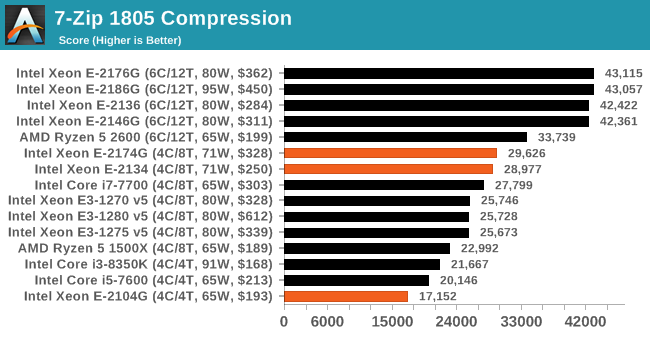
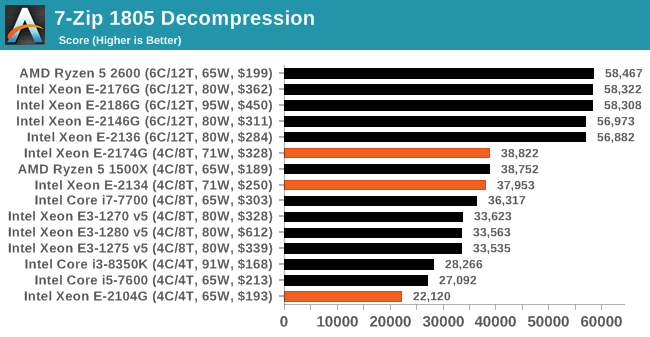
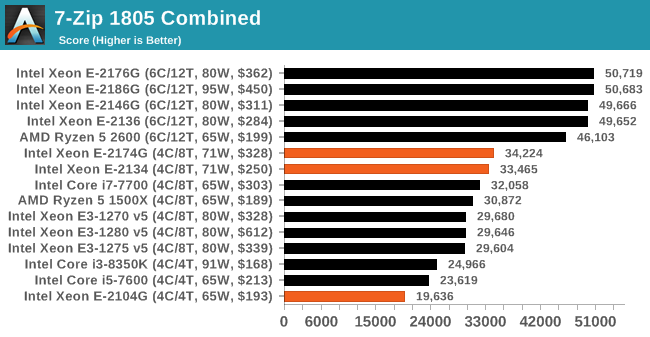
WinRAR 5.60b3: Archiving Tool
My compression tool of choice is often WinRAR, having been one of the first tools a number of my generation used over two decades ago. The interface has not changed much, although the integration with Windows right click commands is always a plus. It has no in-built test, so we run a compression over a set directory containing over thirty 60-second video files and 2000 small web-based files at a normal compression rate.
WinRAR is variable threaded but also susceptible to caching, so in our test we run it 10 times and take the average of the last five, leaving the test purely for raw CPU compute performance.
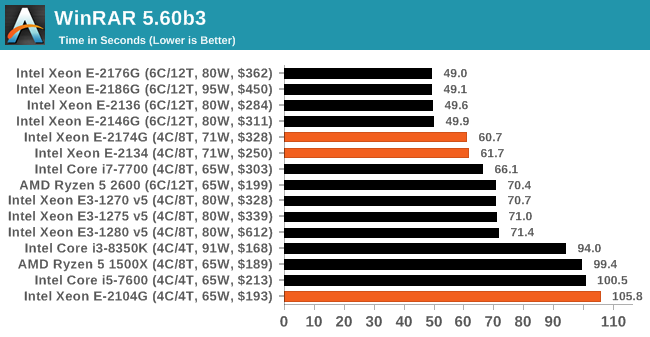
AES Encryption: File Security
A number of platforms, particularly mobile devices, are now offering encryption by default with file systems in order to protect the contents. Windows based devices have these options as well, often applied by BitLocker or third-party software. In our AES encryption test, we used the discontinued TrueCrypt for its built-in benchmark, which tests several encryption algorithms directly in memory.
The data we take for this test is the combined AES encrypt/decrypt performance, measured in gigabytes per second. The software does use AES commands for processors that offer hardware selection, however not AVX-512.
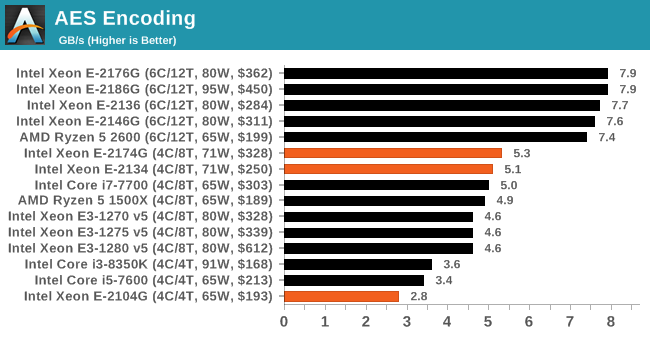










29 Comments
View All Comments
dgingeri - Monday, March 11, 2019 - link
It would be interesting to get comparative data on the 2124G and the 2126G to see if 4/8 or 6/6 would perform better.dgingeri - Monday, March 11, 2019 - link
er, sorry, meant the 2144G, not the 2124G.Stuka87 - Wednesday, March 13, 2019 - link
In my experience, real cores perform better than hyper-threaded cores. So I would be on the 6/6.yankeeDDL - Monday, March 11, 2019 - link
Is it me of the $328 xeon often loses (and sometimes by a sizable margin) to the $199 Ryzen 2600?RSAUser - Monday, March 11, 2019 - link
Definitely, but here the power envelope is important for the test, which Anandtech doesn't seem to give. It's quite worrisome how most of those Xeons are operating outside of their power envelope, that E-2174G that you are referring to is pulling 85W for a rated 71W, so Intel gives a P2 power limit. Why bother with the normal TDP then? The 2600 seems to be owning price/performance and TDP/performance. Question there is EEC memory support, and the guarantee/testing including with Xeons. That's why I mentioned including TR in the benchmarks, or at least the 2700X.This is going to be interesting when AMD releases their 7nm products.
SaturnusDK - Monday, March 11, 2019 - link
All AMD CPUs based on Zen or Zen+ supports EEC RAM. It's up to the MB manufacturer if they have included the support on their MBs. For any workstation build where you don't need the memory bandwidth or superior number of PCIe lanes the TR series offer, you'd use the Ryzen Pro series, not the consumer desktop series.mode_13h - Monday, March 11, 2019 - link
I seem to recall reading that at least some of the Zen-based APUs are lacking ECC-support. I'd love to be proven wrong...notashill - Tuesday, March 12, 2019 - link
AMD has directly confirmed that all Raven Ridge APUs support ECC.https://forums.anandtech.com/threads/amd-ama-start...
Yorgos - Sunday, March 17, 2019 - link
You seem to know nothing.ondma - Monday, March 11, 2019 - link
The 2600 goes over its TDP as well. It actually goes over its TDP by 20%, pretty much the same percentage as the hex core Intel cpus. And as usual, Anand is using an antiquated dgpu for the gaming tests.